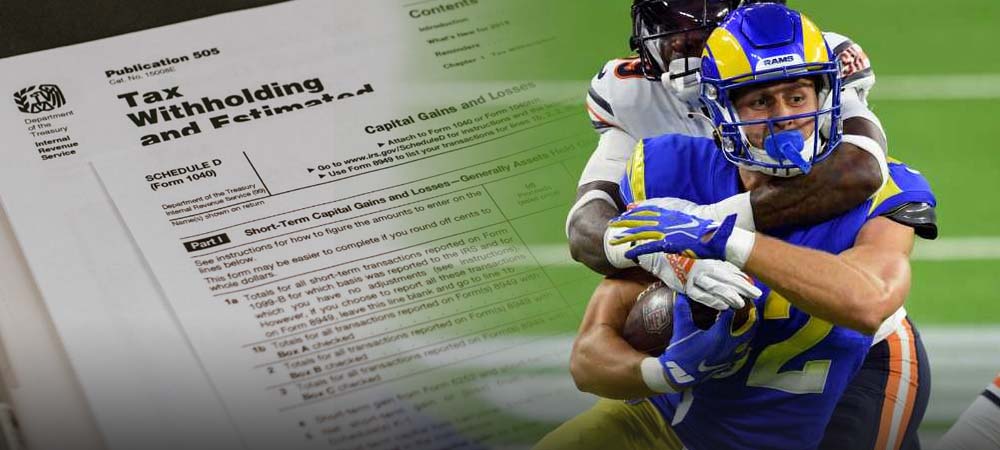- Using reported sports betting numbers across the US, a strength rating is given to all states.
- States with a high rating indicate a successful market, profiting well for the state through tax benefits.
- The states with a lower rating show the success of sportsbooks keeping money despite bettors’ play.
DALLAS – With years of sports betting handle, revenue, and tax data, analyzing the information helps us understand the legal sports betting industry more.
So it begs the question, which states’ sports betting taxing systems have worked the best?
Understanding The Process
Using our sports betting revenue tracker, we created ratios for a state’s contribution across all sportsbooks.
For example, Mississippi sportsbooks took in 0.92% of the amount of money bet on sports in the US. But, they account for 1.29% of all money won by sportsbooks in the US. Therefore, they are performing well against the standard, bringing in a higher percentage of revenue as opposed to their share of the handle.
Many factors influence the data (win rate from bettors, sportsbook tax rates, size of market, etc.). Still, LegalSportsBetting ranked the markets in terms of how well the states with sports betting set themselves up.
Delaware
According to the data, Delaware has had the largest benefit from adding sports betting. Being the fifth smallest market in the US, their 51% tax rate helps boost them along.
But, the largest benefit comes from the terrible betting happening in Delaware. With bettors holding only 81.3% of bets placed, we wonder who is betting this poorly in Delaware. Their hold rate is over double the US average, which sits at 91.9%.
Because of this, their tax portion of the US market versus their handle representation is 8.23x higher. This means that despite Delaware sportsbooks taking in only 0.235% of all US sports betting action, they still had to pay Delaware for tax reasons at almost 2% of the US total for sportsbook taxes.
Even with the success of Delaware sportsbooks against bettors, their tax representation is 3.38x higher than that of revenue.
These metrics led the US by a large margin.
Oregon
Sitting 2nd vs handle and 3rd vs revenue, Oregon has enjoyed regulating its sports betting market.
The sportsbooks in Oregon represent only 0.52% of the US market but account for 1.78% of the tax payments. Winning about 9.5% of all action taken in, Oregon sportsbooks have sent over $60 million to the state.
Rhode Island
Sitting 20th overall (of 29 reporting) in total bets taken in, Rhode Island sportsbooks will likely eclipse the $2 billion mark by the NFL Playoffs. Regardless, their near 9% hold has the state collecting very well.
Flipped in rankings with Oregon, RI sports betting represents 0.7% of the US market. But, their 2.26% tax representation sees help from their 50% tax rate.
New York
No surprise here, New York sports betting has made headlines for their incredible intake of money bet. But also, the 50% tax rate on NY sports betting apps means well for the state.
New York represents 10.1% of the amount of money bet on sports in America. Still, their near-third representation of all US sports betting taxes paid has them as one of four states with a ratio of 1:3 or lower.
New York sportsbooks have paid over $1.06 billion in sports betting taxes. This equates to being $70m shy of the combined tax contributions from Pennsylvania, New Jersey, and Illinois, who rank #2, #3, and #4 behind NY.
Turning The Log Over
On the bottom of the data sheet are a few states that are doing just fine by the numbers. But, the sportsbooks are winning the battle vs the state.
Against the handle, Colorado, Michigan, Arizona and Nevada sportsbooks account for just over a quarter of the US sports betting market. But, their tax payments make up just 7.8%. This means they are keeping high revenue thanks to their lower-than-average tax rates of 10% or less.
Wyoming, Kansas, and Iowa also find themselves in the mix down here.
With successful sportsbooks over the state, it helps in creating a more player-friendly book. Without high taxes cutting from revenue, sportsbooks in these states can afford to have bettors win big without it affecting their bottom line as much.
By the numbers, they are the only seven (of 29) with an overall strength rating under 1. The average is 2.4 with Delaware (11.6) nearly double that of Oregon, Rhode Island, and NY.
Most Successful States
|
Most Successful Sportsbooks
|
Advertising Disclosure
In order to provide you with the best independent sports betting news and content LegalSportsBetting.com may receive a commission from partners when you make a purchase through a link on our site.
News tags: Arizona | Colorado | Delaware | Iowa | Kansas | Michigan | Mississippi | Nevada | New York | Oregon | Rhode Island | Wyoming

After spending time scouting college basketball for Florida State University under Leonard Hamilton and the University of Alabama under Anthony Grant, Michael started writing focused on NBA content. A graduate of both schools, he now covers legal sports betting bills, sports betting revenue data, tennis betting odds, and sportsbook reviews. Michael likes to play basketball, hike, and kayak when not glued to the TV watching midlevel tennis matches.


 Bitcoin Sports Betting Sites
Bitcoin Sports Betting Sites Best Online Sports Betting
Best Online Sports Betting Famous Sports Bettors
Famous Sports Bettors States With Legal Sports Betting
States With Legal Sports Betting Sports Betting Events
Sports Betting Events




